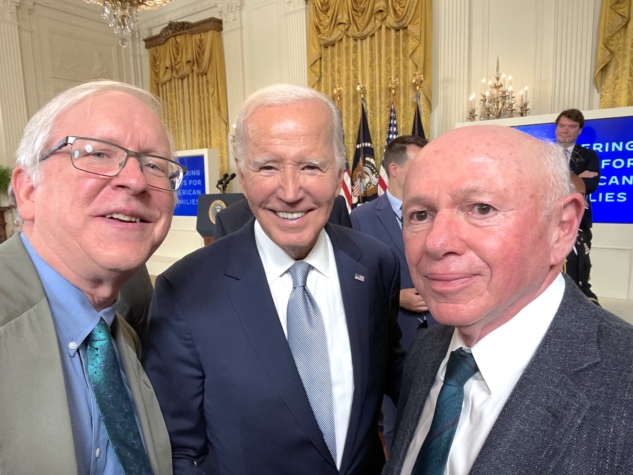
NCPSSM President Max Richtman and Policy Director Dan Adcock were at the White House Tuesday as the Biden administration released the names of the first ten drugs to be subject to price negotiation between Medicare and Big Pharma. They are some of the most common and most expensive prescription medications that seniors take. These essential medications do everything from preventing blood clots and strokes to treating diabetes, and they will soon cost a lot less for the federal government and for patients.
“This is a sea change in the government’s ability to lower prescription drug prices for older Americans, who all too often are compelled to ration medications or forgo filling prescriptions because of soaring costs.” – Max Richtman, NCPSSM President & CEO, 8/29/23
The Inflation Reduction Act of 2022 empowered Medicare to begin negotiating prices for targeted prescription drugs, something advocates including NCPSSM have struggled to achieve for more than twenty years. Here is a list of the first ten drugs that will be subject to price negotiation with Medicare:
- Eliquis, for preventing strokes and blood clots
- Jardiance, for diabetes and heart failure
- Xarelto,for preventing strokes and blood clots
- Januvia, for diabetes
- Farxiga, for diabetes, heart failure and chronic kidney disease
- Entresto, for heart failure
- Enbrel, for arthritis and other autoimmune conditions
- Imbruvica, for blood cancers
- Stelara, for Crohn’s disease
- Fiasp andNovoLog insulin products for diabetes
Drugmakers made a whopping $493 billion in revenue from these ten drugs, which have accounted for more than $170 billion in gross Medicare spending, according to a report from the nonprofit, Protect Our Care.
President Biden hailed the release of the first ten medications for negotiation as a victory for everyday Americans, who have been subject to price gouging by the drug industry. “There is no reason why Americans should be forced to pay more than any developed nation for life-saving prescriptions just to pad Big Pharma’s pockets,” he said
According to the White House, the 9 million seniors who take the ten targeted drugs will see their costs decrease. These seniors currently pay up to $6,500 in out-of-pocket costs per year for these prescriptions. The nonpartisan Congressional Budget Office reports that this will save taxpayers $160 billion by reducing how much Medicare pays for drugs through negotiation and inflation rebates.
The seniors who have been victimized by price gouging and now will finally get some relief are front of mind for advocates, including Patients for Affordable Drugs Now. The group quotes a Medicare beneficiary in North Carolina who lives with a rare cancer and type 2 diabetes:
“To treat my diabetes, I take Januvia, which carries a monthly list price of $547. Drugmaker Merck has made a fortune from patients like me who are forced to pay whatever price the company dictates. A fairer price for Januvia will mean a world of difference.” – Steven Hadfield, Matthews, NC
The list of drugs subject to negotiation will expand next year to 15, followed by another 15 medications the year after. Negotiated prices for the first ten drugs do not go into effect until 2026.
NCPSSM’s senior health policy expert, Anne Montgomery, says the Biden administration (HHS & CMS) did a “savvy job” of selecting the first set of drugs for negotiation because they are “ten of the highest cost and most commonly used medications” among seniors. “That’s very smart,” she says, “as a way of building a constituency among beneficiaries for the movement to lower drug prices.”
Several drugmakers are suing the Biden administration, claiming that Medicare drug price negotiation is unconstitutional — despite the fact that the V.A. has been successfully negotiating drug prices with Big Pharma for years. Administration officials say that they believe the drug companies have a weak case and will not prevail.
Advocates like NCPSSM are not resting with the implementation of the Inflation Reduction Act’s drug provisions. “The next step is to enlarge the number and type of medications subject to negotiation, to deliver maximum relief to seniors on fixed incomes,” says Richtman. “No one should have to choose between groceries, rent, or essential medications — especially our nation’s senior citizens.”


